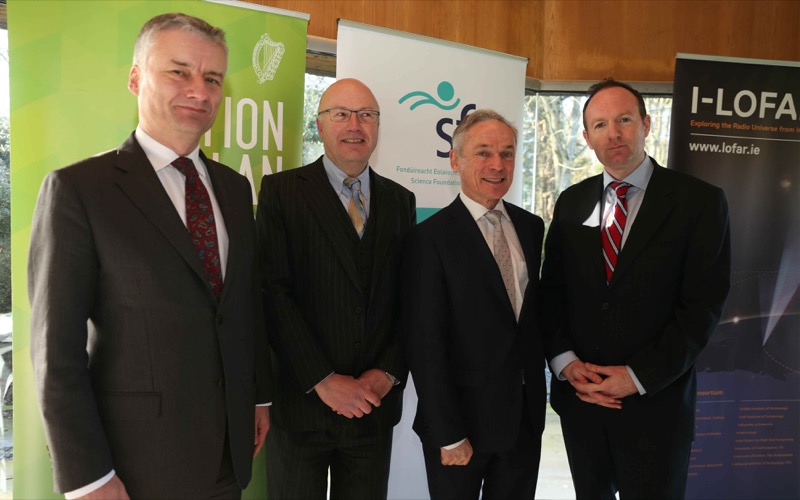Trinity Secures over €10m As Part Of SFI Investment In Research
Posted on: 12 January 2016
Science Foundation Ireland (SFI) today awarded over €10 million to Trinity College Dublin for five exemplary research projects across three sectors. The announcement was made as part of an overall €28 million investment in research equipment and facilities.
The five Trinity projects are as follows:
- The Low Frequency Array (LOFAR) is a €150 million network of radio telescopes that is being deployed across Europe. LOFAR is revolutionising our understanding of the Universe and driving innovations in information and communications technologies. I-LOFAR, the Irish LOFAR consortium which is headed up by Associate Dean of Research and Professor in Astrophysics Peter Gallagher, will use this SFI funding to build a LOFAR telescope in Birr Castle. SFI funding: €1.4 million.
(Big Data Analytics, Internet of Things (IoT) and Networks Sector)Commenting after the funding awards Professor Gallagher said: “The Irish LOFAR station at Birr builds on Ireland’s great scientific heritage of the Leviathan Telescope of Birr and will connect us to the largest low frequency radio telescope in the world. I-LOFAR will inspire students to study science, engineering and computer science, and attract additional visitors to Birr. It will also act as a magnet to attract technology companies to the area.”

- The Internet-of-Things connects everyday objects to the Internet allowing useful information to be communicated to other objects, machines or humans. Pervasive Nation is a new, Ireland-wide, wireless network which will support Internet-of-Things (IoT) research and innovation. Designed and managed by the CONNECT Centre, and led by Professor Linda Doyle, Pervasive Nation will allow new IoT concepts, business models and devices to be developed and tested. The network will eventually make Ireland the first country in the world with full, IoT network coverage. SFI funding: €1.8 million
(Big Data Analytics, Internet of Things (IoT) and Networks Sector)
- Additive Manufacturing (AM) provides a method to prototype and customise products quickly and at low cost. The new infrastructure includes plastic, metal and ceramic 3D printing, ink-jet printing and polymer processing equipment. It will allow Trinity’s AMBER researchers, led by Professor Stefano Sanvito, to develop innovative 'printable materials' such as 3D hip and knee implants, energy storage technologies such as supercapacitors, nanocomposites for medical devices and novel nanosheets for the ICT sector. SFI funding: €3.3 million
(Manufacturing Sector)
- Trifolium Dubium will be a sputter-deposition tool capable of growing complex, device-quality stacks of metal and oxide thin films. The development of Trifolium Dublium, led by Dr Plamen Stamenov of AMBER, will enable physicists, chemists and material scientists to compete internationally for research and technology funding, partnering productively with the IT and energy sectors in the country. SFI funding: €3.2 million
(Manufacturing Sector)
- The GeoRise, by Trinity’s Balz Kamber of iCRAG, is a special type of scanning electron microscope, which geoscientists will use to investigate real-world sized rocks at sub-microscopic scale. Most importantly, the GeoRise can quantify the content of valuable metals in rocks in unprecedented detail. It will thus be used to develop new approaches to resource and energy efficiency. SFI funding: €636,161
(Natural Resources & Hazards Sector)
The awards were announced at Birr Castle, Co Offaly, earlier today.
